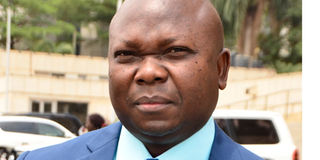I’d rather be disowned by NRM than my constituents

Voted no. Bwamba County MP Richard Muhumuza Gafabusa (NRM). PHOTO BY ALEX ESAGALA
What you need to know:
- Age limit. Mr Richard Muhumuza Gafabusa (NRM) is the Member of Parliament for Bwamba County, Bundibugyo District.
- Serving his first term, Gafabusa was unopposed during the 2016 elections and now sits on the Committee on Legal and Parliamentary Affairs.
- He was one of the NRM MPs who voted against the Constitution amendment to lift the presidential age limit. Amos Ngwomoya caught up with him.
Why, as an NRM MP, did you defy your party and vote no to the age limit Bill?
I didn’t defy the party position because some of us found ourselves between a rock and a hard place, and actually the person who encountered the biggest challenge was me.
I have been telling people who didn’t know that the first district to be captured by NRA in the Rwenzori sub-region was Bundibugyo and this tells you how people of Bwamba County are NRM people. They have no problem with President Museveni and I put in writing all their reasons for not supporting the amendment and I presented them to the party chief whip, the Prime Minister and President.
Secondly, I am a member of the legal committee that scrutinised this Bill, but I think because of the flow of events and how the process was handled by the party is what caused us trouble.
For instance, the party pronounced itself on the matter before we could consult the people. Ideally, we would first consult our voters so that we bring feedback to the caucus, but this wasn’t the case.
What reasons did your voters give for not supporting the amendment?
One of the major reasons was that they didn’t want the President to spoil his legacy which he has built for the last three decades. They said it’s the right time for the President and the NRM party to choose a new person to replace Mr Museveni instead of extending his rule that would make him end up in Ugandans’ bad books.
But what annoyed my people the most was that they were mistreated in the last general election by the party electoral commission and they tried to appeal to the chairman in vain.
From that time, they started losing trust in the party because officials announced candidates of their choice with a lot of arrogance. Gen [Henry] Tumukunde compiled a report but it has never seen the light of day.
The party chairman never intervened yet he has done so in other areas with similar challenges. People think that mafias have infiltrated our party and with this, they lost loyalty to the party. So the position of my people was a protest vote.
We understand you met the President before voting in Parliament. What reasons did you give him for not supporting an amendment he campaigned for?
I haven’t met the President on my own, but we only met him as the Legal Affairs committee to present to him our report. But even when we went there, he was quick to say that ‘please let us talk as a committee and don’t bring your constituency issues here’. I think he had learnt that some of our voters had said no. So we were limited to the committee work.
But immediately I came back from my consultations, I met the chief whip and Prime Minister one-on-one and I also put in writing the position of my voters. The chief whip assured me that she would present my issues to the President.
And if there was a convincing response to the issues raised by my voters, perhaps they would have revoked their earlier position. But there was no response. So voters asked me never to dare touch it and they even threatened to burn my house by the way.
Doesn’t it bother you that you are the only MP from Bundibugyo District who voted against the Bill?
It doesn’t bother me because my colleagues and I have different constituencies with completely different dynamics. In my constituency, there are eight sub-counties but my colleague, the Woman MP, lost in almost all of them and that shows you that we have different voters.
Secondly, we didn’t do collective consultative meetings and the approach we used, each one knows. If someone decided to have boardroom meetings with few people, then that’s their approach. But for me I am convinced that the approach I used to consult all people was inclusive and all people were on board, irrespective of age, sex, tribe and status.
You come from the Obudhingiya Bwa Bwamba (OBB) cultural institution which one would think actually needs government support since it’s a young institution. Don’t you think the position of your voters on the amendment could have adverse effects on the operations of this institution?
That’s one thing I tried to avoid in my consultations; to bring OBB at the centre of this whole controversy.
We have had trouble where people tend to mix cultural issues and politics. People who attended my consultations did so as individuals and not as a cultural institution.
But, of course yes, people are annoyed with the lukewarm support of government towards the OBB cultural institution and it’s actually one of the reasons why they protested the amendment.




